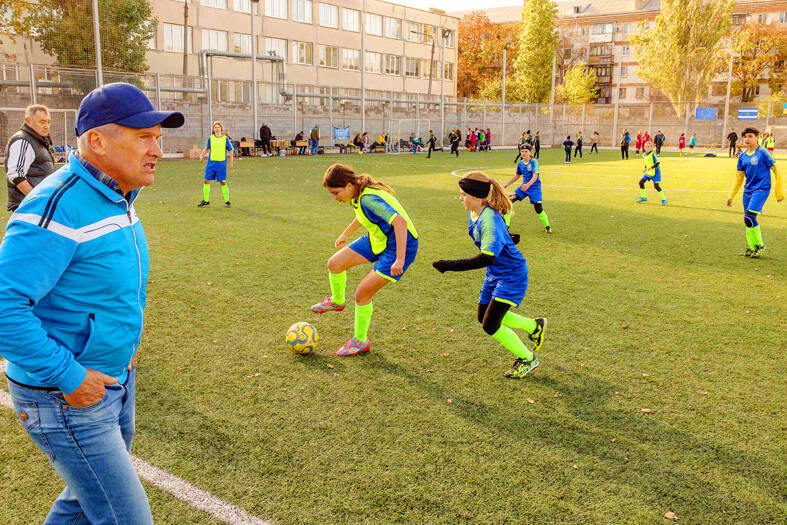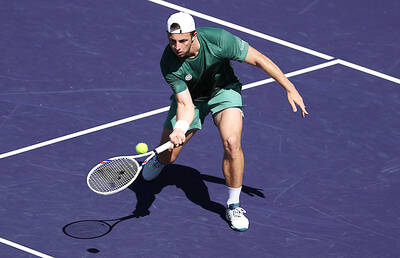On an icy morning in southern Ukraine, soccer coach Vyacheslav Rol shouts to his team over the sound of distant explosions.
“Everybody on the bus,” he says.
A group of girls aged from nine to 11 pile in. Krystal Kherson were headed for a competition in Mykolaiv, about 70km west of Kherson, their hometown near the southern frontline that is shelled by Russian forces almost daily.

Photo: AFP
“The training is good for them,” the 67-year-old coach told reporters. “They forget about the bombs.”
Russian forces occupied Kherson city for eight months last year.
It was recaptured by Ukrainian troops in November last year, but the city still sits near the frontline.
As the bus passed through war-ravaged countryside, the team intoned a popular local song to keep their spirits up: “Kherson, I dream of you at night.”
During the journey, deputy coach Igor Psurtyev recounted how he went around the empty, devastated city during the occupation looking for his players.
“When this one saw me her eyes lit up,” he said, pointing to one of the children whom he calls “Messi in a skirt.”
In Mykolaiv, another player, Dana, said she used to not like soccer, but that changed during the war.
“I followed the example of a friend who was doing it. I didn’t want to stay at home,” said the 11-year-old, wearing the club’s blue and green fluorescent jersey.
Dana said that she and her family now live in Odesa — even further to the west — ever since a missile landed near their home.
“I was very afraid. My father covered me with his body,” said Dana, who continues to play in Kherson even though it is 220km away “because it’s my city.”
On the pitch in Mykolaiv, the teams sing the national anthem with their hands on their hearts and Rol says a few words to motivate the players before kick-off.
“I see before me girls that stayed strong during the occupation and the bombing,” he says. “Nothing will stop them playing football.”
The team then held a minute’s silence for the war dead, including the team’s captain, who lost her father at the front.
When the whistle blew, Lyudmyla Kramarenko, Dana’s mother, cheered as if the game was a World Cup final.
“Go Kherson,” the 45-year-old shouted.
Kramarenko recounted how Dana would have nightmares when the city was under fire while they were still living there.
“I had to sleep with her during the attacks,” she said.
However, her daughter would come back happy after training.
“I saw that it was important for her,” she said.
At the end of the competition, Rol took down the Ukrainian flags put up for the matches.
“I used to hide them at my place during the occupation,” he said.
He also described how he was approached at that time by members of Russia’s FSB security service to train a team.
“I refused. The children thought I was going to be killed, but nothing happened to me,” he said. “I played the old senile guy.”
At the end of the tournament, the Kherson girls placed third out of six teams.
“Kherson stays strong,” the coach tells them as they return to their bombed-out city with smiles on their faces.

Tallon Griekspoor on Friday stunned top seed Alexander Zverev 4-6, 7-6 (7/5), 7-6 (7/4) in the second round at Indian Wells, avenging a devastating loss to the German at Roland Garros last year. Zverev, the world No. 2 who is heading the field of the prestigious ATP Masters event with No. 1 Jannik Sinner serving a three-month drugs ban, is the first Indian Wells men’s top seed to lose his opening match since Andy Murray in 2017. It was a cherished win for Griekspoor, who had lost five straight matches — including four last year — to the German. That included a five-setter

Donovan Mitchell on Wednesday scored 26 points as the Cleveland Cavaliers punched their ticket to the NBA playoffs with a hard-fought 112-107 victory over the Miami Heat. A seesaw battle in Cleveland saw the Heat threaten to end the Cavs’ 11-game unbeaten streak after opening up a seven-point lead late in the fourth quarter, but the Cavs clawed back the deficit in the closing minutes to seal their 12th straight victory and a place in the post-season. The Cavaliers improved to 52-10, maintaining their stranglehold on the Eastern Conference with 20 games of the regular season remaining. Mitchell was one of six Cleveland

VALUABLE POINT: Relegation-threatened Valencia snatched a thrilling 3-3 draw at CA Osasuna thanks to a remarkable backheel volley by Umar Sadiq Barcelona on Sunday secured a comfortable 4-0 win over Real Sociedad to move back top of La Liga. Aritz Elustondo’s early red card gave Hansi Flick’s side a comfortable afternoon, with Gerard Martin, Marc Casado, Ronald Araujo and Robert Lewandowski on the score sheet. Atletico Madrid beat Athletic Bilbao on Saturday to temporarily knock the Catalans from their perch, while Real Madrid, third, lost at Real Betis Balompie. Flick was able to rotate his side a little ahead of the UEFA Champions League round-of-16 visit to face SL Benfica tomorrow and still move one point above Atletico. “There were a lot of things that

Steve Smith yesterday announced his retirement from one-day international (ODI) cricket after captaining Australia to a semi-final exit at the ICC Champions Trophy, bringing down the curtain on a career in the format that included two ICC World Cup wins. The 35-year-old batsman, who was his team’s top scorer with 73 as Australia lost to India by four wickets in Dubai on Tuesday, said he would still be available for selection for T20 internationals and Test matches. “It has been a great ride and I have loved every minute of it,” Smith said in a Cricket Australia statement. “There have been so